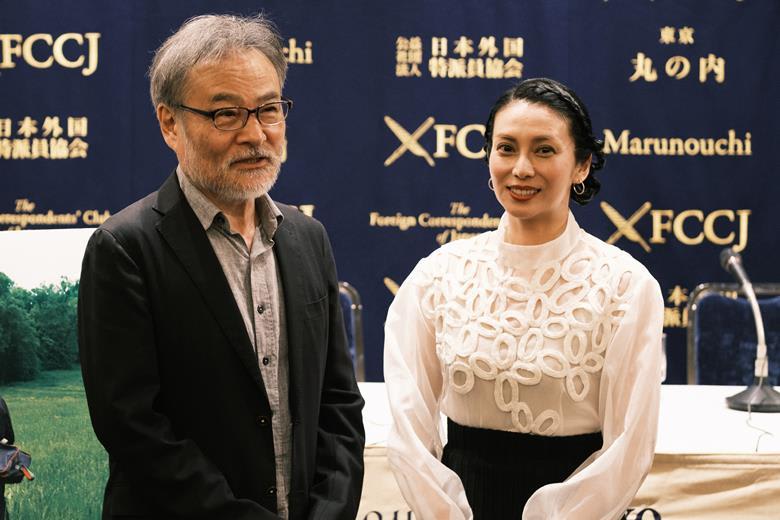Japanese auteur Kiyoshi Kurosawa talks remaking crime thriller ‘Serpent's Path'
The film is a remake of his own 1998 film of the same name.
By Matt Schley 17 Jun 2024

Japanese auteur Kiyoshi Kurosawa has revealed why he decided to remake his 1998 thriller Serpent’s Path in France and the differences he encountered in the filmmaking cultures.
The adaptation, also titled Serpent’s Path, is released in Japan today (June 14) by Kadokawa.
Kurosawa explained that the impetus for the project came when French producers Cinefrance Studios asked which of his own films he would like to remake in France if given the chance.
“I immediately responded with Serpent’s Path,” said the prolific director, whose accolades include winning best director at Venice in 2020 with Wife Of A Spy; the Un Certain Regard jury prize at Cannes in 2008 with Tokyo Sonata; and Un Certain Regard directing prize in 2015 with Journey To The Shore.
“I’d never done a self-remake and moving the story to France involved restructuring the entire film. I wasn’t sure what the right way to do a self-remake was, but I decided it wouldn’t be a bad thing to leave a large part of the original as-is. We all know that legendary director Alfred Hitchcock remade his films, so that gave me confidence that a self-remake wasn’t a taboo thing to do.”
The original centred a man who enlists a friend to help him take and torture hostages who he believes murdered his daughter. This new version moves the action to France, with the mourning father played by Damien Bonnard (Asteroid City, Les Miserables) alongside a mysterious Japanese doctor whose true intentions are unclear played by Ko Shibasaki (47 Ronin, Battle Royale).
Kurosawa further explained that while the original was written by Hiroshi Takahashi, co-writer of iconic horror Ring, this version was written by Kurosawa himself alongside French journalist Aurélien Ferenczi. The biggest change was swapping the gender of the lead from man to woman, as played by Shibasaki.
Speaking to press at the Foreign Correspondents’ Club of Japan ahead of the release, Shibasaki explained that the hardest part of the process was performing almost entirely in French, making her character believable as a woman who has lived and worked in France for a decade. That challenge extended to communicating with the largely French crew. Shibasaki, who speaks fluent English, explained that while she probably could have spoken to the crew in English, she wanted to speak French to help stay in character.
“Thankfully, by the end of the production, I was able to understand a bit of what they were saying to me,” she said. “I’d like to continue to challenge myself and perform in other languages.”
For Kurosawa, it marked his second feature in France after Daguerrotype, starring Tahar Rahim and Constance Rousseau, which played Toronto in 2016.
As screenwriter, one key challenge he faced was in how to portray the daily life of his mysterious and single-minded main character.
“I wracked my mind, asking myself what this woman does day-by-day during her solitary life,” said Kurosawa. “I ultimately decided she doesn’t do anything.” With that idea in mind, he built scenes in which Shibasaki simply stares at a robot vacuum cleaner as it quietly prowls her apartment.
Cultural differences
When asked by Screen about the differences in filmmaking culture between Japan and France, Kurosawa heaped praise on the French approach to production.
“To be honest, there are a lot of things I prefer about filmmaking in France,” said the director. “In France, if you make plans with someone for dinner, there’s a good chance they’ll arrive 30 minutes late, but when it comes to a film set, they arrive 30 minutes early, which shows how much respect there is in France for cinema.
“I remember once when someone asked if they could leave early because they had plans to go to the theatre with their wife. In Japan, the only reason you’d ask to go home early is if your mother or father died or something. I thought that was a wonderful thing, and that France is a wonderful cultural environment to be in.”
Kurosawa is known for not looking back on his films after they are made, which would seem to pose a problem when it comes to a remake. However, in true form, the director explained that while he revisited the script, he did not rewatch the original during preparation.
“That said, I did have to check how long the hostages’ chains were, so I did rewatch a few minutes,” said the director, referring to the chains used by the protagonists to hold their hostages in place.
The film is a co-production between France’s Cinefrance Studios, Japan’s Kadokawa and Belgium/Luxembourg outfit Tarantula. A French release has yet to be dated.
Kurosawa remains a prolific filmmaking force in Japan, with Serpent’s Path just one of three films set for release this year. His mid-length film Chime received its world premiere at this year’s Berlinale and he is in post-production on suspense thriller Cloud, which is set for a Japanese release in September.
Latest news & features
Featured profiles
Promote your services with KFTV
Choose from three profile types - Basic, Silver and Gold
Create ProfileWe offer a range of display advertising opportunities.
Learn More